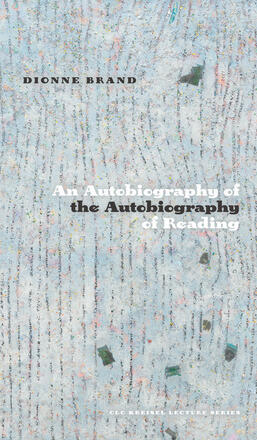
An Autobiography of the Autobiography of Reading
La description
Internationally acclaimed poet and novelist Dionne Brand reflects on her early reading of colonial literature and how it makes Black being inanimate. She explores her encounters with colonial, imperialist, and racist tropes; the ways that practices of reading and writing are shaped by those narrative structures; and the challenges of writing a narrative of Black life that attends to its own expression and its own consciousness.
Récompenses
- Winner, AUPresses Book, Jacket, & Journal Show - Poetry and Literature 2020
- Winner, Trade Non-Fiction Book of the Year | Alberta Book Publishing Awards, Book Publishers Association of Alberta 2021
Reviews
"How . .. do we begin to detoxify our reading practice in a way that lets the reader into the frame, away from the aegis of racism, xenophobia, and violence that layer our 'timeless' classics?"
- Shivanee Ramlochan
“An Autobiography of the Autobiography of Reading is exemplary and eye-opening. It reckons with coloniality and the narrative demands it makes in our lives and in our stories, examining canonical texts through close-reading strategies and reflexive thinking that are unparalleled in their clarity and rigour. ” [Full article at https://humberliteraryreview. com/reviews-1/2020/06/10]
- Shazia Hafiz Ramji
"Brand brings a poet's emotional lucidity to her recollections of growing up a voracious reader, and of the creeping realization that the literature she consumed as a Black woman was not written for her. "
- Miranda Martini, Alberta Views Magazine, October 2021
"Born in 1953, nine years before Trinidad & Tobago gained independence from the United Kingdom in 1962, she is uniquely poised to critique empire, the literary canon being an imperial project.... In this lecture...Brand mapped its limits and questioned its capacity to contain us, when these books are so often hailed to effortlessly do just that."
- Akilah White, The Book Slut, 05/12/2020
“Like all of Brand’s writings—her fiction, poetry, and essays—this book offers another compelling perspective on the possibilities of Black aesthetics and continues her crucial interventions that seek to overturn the epistemic violences engendered by colonial literature, reading, and archival practices.... Brand reflects on her early experiences of reading the colonial canon of writers like Thackeray and how encounters with colonialist tropes in effect render her—and other similar postcolonial othered subjects—invisible.”
- Nicole N. Aljoe, Modern Philology